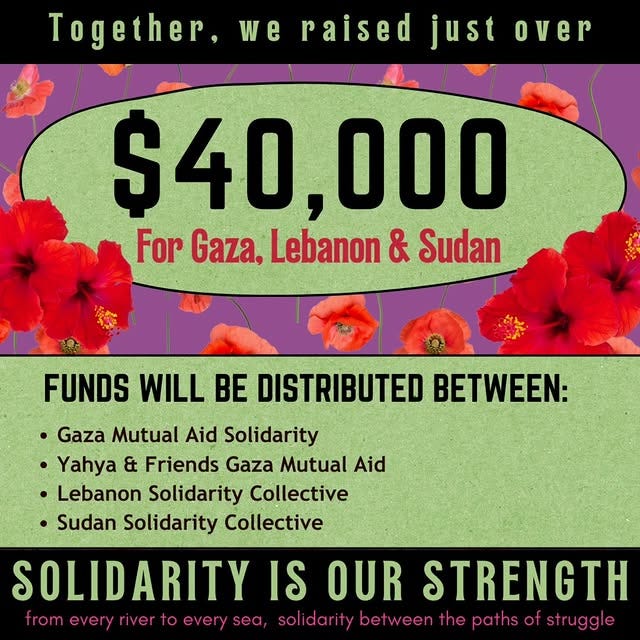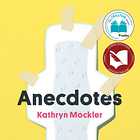Gatherings: Murray Sinclair, Francesca Albanese, Writers' Trust Speeches, Public Domain Movies, Farzana Doctor, Between the Covers, Science Fiction and the Alt-Right, Onion Man 2.0., and more
Gatherings | Issue 42
Welcome New Subscribers
Send My Love to Anyone got some new followers and subscribers from the above post.
Welcome! I’m glad you’re here. I’m also glad you have a sense of what this newsletter is all about!
You can find out more about Send My Love to Anyone in the About section. I don’t like to flood inboxes, so I only send the newsletter out once or twice per month—once for the issue and once for the Gatherings section.
However, I do update the website a couple times a week if you’re looking for something to read or a writing prompt.
Gatherings is a section of Send My Love to Anyone where I share what I’ve been reading, watching, listening to, or appreciating over the past month. I also share contributor news (when they send it to me—please send it to me contributors!) and literary events in Canada or online.
I’m curious about the ways in which literary arts connect with the world, our humanity, and our environment.
I also love all things creativity, writing process, film, music, art, small press, and book marketing.
I’ve started a new podcast on SMLTA where I’m serializing my first book Onion Man, an autofictional novel-in-verse about living in an alcoholic home and working at corn canning factory in the late 1980s. You can listen to Episodes 1 &. 2 of Onion Man 2.0.
Hope you enjoy!
Kathryn
Gatherings
Some Goodness
Libro
I just switched from Audible to Libro for audiobooks where my purchases support Another Story Bookshop. You can pick any independent bookstore that you want. So far it’s a great alternative to the Amazon monster.
Indie Bookstores
Here’s a link for Canadian’s to shop at Indie Bookstores!
The auction I participated in raised $40 000 for Gaza, Lebanon & Sudan!
Recommended Viewing
RIP Murray Sinclair, the first Indigenous judge appointed in Manitoba and chair of the Truth and Reconciliation Commission (TRC).
Francesca Albanese at the University of Toronto
Albanese is an Italian international lawyer and academic and the United Nations Special Rapporteur on the occupied Palestinian territories.
Speeches from the Writers’ Trust Awards.
Saeed Teebi introducing Atwood-Gibson Writers' Trust Fiction Prize:
Madeleine Thien
Rita Wong
Sarah O’Leary
Kagiso Lesego Molope
Let’s not forget Kagiso Lesego Molope’s brave words and stance earlier this year at the Politics and the Pen event where she was kicked out.
At the Taormina Film Festival, Palestinian film director Rashid Masharawi presented “From Ground Zero,” a compilation of 22 short films, shot by filmmakers inside the Gaza Strip during the current war. He spoke with Variety about the process of making the film and what it means to face appalling conditions with art.
“I was born and grew up in Gaza, I made many films in Gaza as a director and producer, and this time after I saw all what’s going on, I said, ‘No, I am not going to make a film, instead, I’m going to give the chance to the Palestinian filmmakers, and filmmakers who are in Gaza now, sharing what’s going on with the people,'” Masharawi said.
Read Palestinian Director Rashid Masharawi on Producing 22 Short Films in Gaza During the War by John Bleasdale in Variety
Public Domain Movies
Artist Basel Elmaqosui: “ Don’t Cry for Gaza….Cry for yourself.”
“Jabalia camp... So we don't forget... Mountains the heart is bleeding .... I paint with love .. I don't paint with war, I paint to try to stay an awake and sensitive human being and that war does not remove my dignity and humanity #مازال_عايشين Don't Cry for Gaza... Cry for yourself, don't cry for Gaza... Cry to yourself”
Dennis Cooper and Derek McCormack:
Recommended Listening
RIP Dorothy Allison.
Farzana Doctor
Listen to 5 Steps To Unblend When Feeling Overwhelmed by Farzana Doctor
Between the Covers with Lidia Yuknavitch:
Recommended Reading
“My life has gone rosy, again,” Alice Munro told a friend in a buoyant letter of March 1975. For Munro, who was then emerging as one of her generation’s leading writers, the previous few years were blighted by heartbreak and upheaval: a painful separation from her husband of two decades; a retreat from British Columbia back to her native Ontario; a series of brief but bruising love affairs, in which, it seems, Munro could never quite make out the writing on the wall. “This time it’s real,” she wrote, speaking of a new romantic partner, the emphasis acknowledging that her friend had heard these words before. “He’s 50, free, a good man if I ever saw one, tough and gentle like in the old tire ads, and this is the big thing — grown-up.”
Read What Alice Munro Knew by Giles Harvey in The New York Times
On Monday night, the gala for the Giller Prize, Canada’s most prestigious literary award, took place at Toronto’s Park Hyatt hotel. The Giller Foundation has been dogged by controversy for over a year due to its corporate sponsors’ ties to Israel’s largest arms manufacturer, the Israeli Defense Forces, and an Israeli real estate company with investments in West Bank settlements.
Ahead of this year’s gala, more than 200 Canadian authors refused to submit their books for Giller Prize consideration or participate in any Giller-related publicity until the Foundation committed to dropping their partnerships with these corporate sponsors.
Read Jody Chan’s Boycott Giller Speech, “Here, today, we throw our labour into the gears of the death machine.”
is on Substack! Yay!
Above all, Craft is the result of market forces; it is therefore the result of imperial forces, as the two are so inextricably bound up together as to be one and the same. The Craft which is taught in Western institutions, taken up and reproduced by Western publishers, literary institutions, and awards bodies, is a set of regulatory ideas which curtail forms of speech that might enact real danger to the constellation of economic and social values which are, as I write this, facilitating genocide in Palestine and elsewhere across the globe. If, as Audre Lorde taught us, the master’s tools cannot dismantle the master’s house, then Craft is the process by which our own real liberatory tools are dulled, confiscated, and replaced. We believe our words sharper than they turn out to be. We play with toy hammers and think we can break down concrete. We think a spoon is a saw.
Read Notes on Craft: Writing in the Hour of Genocide by Fargo Tbakhi in Protean (with thanks to for the h/t)
Writers are freaking out about this with good reason:
On Friday, author Daniel Kibblesmith posted a series of screenshots on Bluesky in order to share a concerning email he received from the agency who’d repped him on his children’s book Santa’s Husband: the book’s publisher, HarperCollins, was offering $2,500 (non-negotiable) for the right to use the book in an AI training deal that they’d signed with an anonymous “large tech company.”
Read HarperCollins is selling their authors’ work to AI tech by Drew Broussard in Lit Hub
Jess Maginity reviews Jordan S. Carroll’s Speculative Whiteness: Science Fiction and the Alt-Right.
IN THE 1970s, a group of French right-wing intellectuals coalesced around the idea that cultural influence, not direct political action, determines the future. Led by Alain de Benoist, the Research and Study Group for European Civilization (GRECE) borrowed heavily from communist intellectual Antonio Gramsci to promote the ideas of what would become the French Nouvelle Droite (New Right). At the time Gramsci was writing, communist doctrine theorized culture as something emergent from the economy, and not something with a distinct impact on the organization of a given society. Gramsci disagreed. He argued that ideas, politics, and economics are each active forces in society and while they all impact each other, none of them simply emerges from another. The New Left embraced this paradigm through countercultural movements in the 1960s; what is often overlooked in history books is how a New Right was not far behind. The use of culture as a vehicle for politics (referred to as metapolitics) belongs to neither the Right nor the Left; a culture war needs two adversaries.
Read Whose Future Is It Anyway? by Jess Maginity in the LA Review of Books
Nicole Louie knew she did not want to have children. But she had no idea what a life without children looked like. The only stories she heard growing up in Brazil were about eccentric aunts, crazy cat ladies and pitiful barren women. Others Like Me gathers the stories of 14 women from around the world who decide -for a variety of reasons - not to become mothers. It is also a luminous memoir of love, reconciliation and self-acceptance. In Part One of this series, Louie shares how her interviews with the women changed her perceptions of what women can give each other. We also talk about the myriad ways to nurture, JD Vance, and the legacy of women.
Donna Bailey Nurse interviews Nicole Louie about Others Like Me: The Lives of Women without Children in Black Iris
“Some memories never heal. Rather than fading with the passage of time, those memories become the only things that are left behind when all else is abraded. The world darkens, like electric bulbs going out one by one. I am aware that I am not a safe person. Is it true that human beings are fundamentally cruel? Is the experience of cruelty the only thing we share as a species? Is the dignity that we cling to nothing but self-delusion, masking from ourselves this single truth: that each one of us is capable of being reduced to an insect, a ravening beast, a lump of meat? To be degraded, damaged, slaughtered–is this the essential fate of humankind, one which history has confirmed as inevitable?"
—Han Kang from Human Acts
As instructors struggle to meet the complex needs of students, schools are leaving both to fend for themselves
Read Are Universities Failing the Accommodations Test? by Simon Lewsen in The Walrus
shares tips for organizing and protest:
Love this post by !
interviews Wayde Compton
From , How to Read a Trans Fem Writer
Writing Prompts
Here’s an excellent prompt from Poets & Writers
“In the title story of Saeed Teebi’s 2022 debut collection, Her First Palestinian (House of Anansi Press), a new romance begins with the main character, Abed, acknowledging what is involved in getting to know another person: “Not long after the first joys of finding each other had settled, Nadia asked me if I would teach her about my country. It was inevitable. The walls of my Toronto apartment were conspicuously covered with Palestinian artifacts, and donation brochures featuring Gazan children were often lying around.”
Prompt from the Poet’s & Writers Magazine series From the Start on 10:23:24
Where Do I Start? Prompts
Book Giveaway
What are your gatherings? What have you been reading, watching, or listening to. Please share your news in the comments.
Support Send My Love to Anyone
Support Send My Love to Anyone by signing up for a monthly or yearly subscription, liking this post, or sharing it!
Big heartfelt thanks to all of the subscribers and contributors who make this project possible!
Connect
Bluesky | Instagram | Archive | Contributors | Subscribe | About SMLTA





















